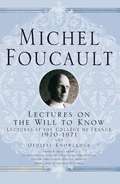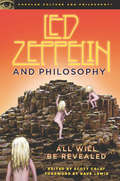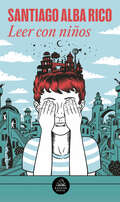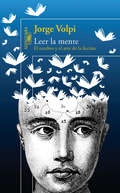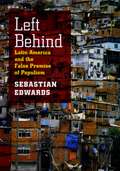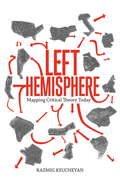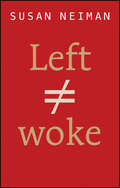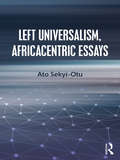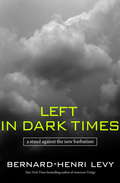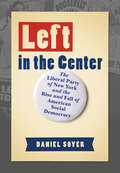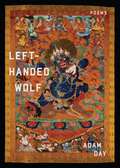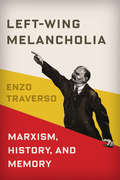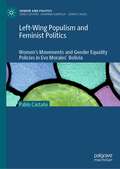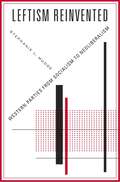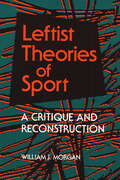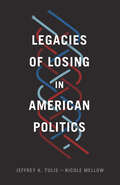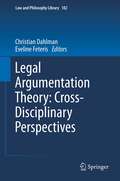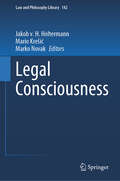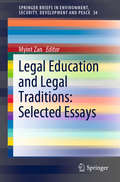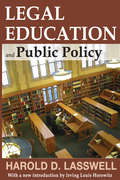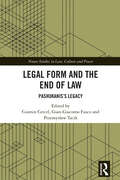- Table View
- List View
Lectures on the Will to Know: Lectures at the College De France 1970–1971 and Oedipal Knowledge
by Daniel DefertLectures on the Will to Know reminds us that Michel Foucault's work only ever had one object: truth. Here, he builds on his earlier work, Discipline and Punish, to explore the relationship between tragedy, conflict, and truth-telling. He also explores the different forms of truth-telling, and their relation to power and the law. The publication of Lectures on the Will to Know marks a milestone in Foucault's reception, and it will no longer be possible to read him in the same way as before.
Lectures on the Will to Know: Lectures at the College de France 1970-1971 and Oedipal Knowledge
by Michel Foucault Graham Burchell Daniel DefertIn the first of his annual series of lectures at the Collège de France, Foucault develops a vigorous Nietzschean history of the will to know through an analysis of changing procedures of truth, legal forms, and class struggles in ancient Greece.
Led Zeppelin and Philosophy
by Scott CalefLed Zeppelin, who bestrode the world of rock like a colossus, have continually grown in popularity and influence since their official winding up in 1980. They exasperated critics and eluded classification, synthesizing blues, rock, folk, rockabilly, funk, classical, country, Indian, and Arabic techniques. They performed the alchemical trick of transmuting base led into gold-and platinum-and diamond. They did what they would, finding wisdom through personal excess and artistic self-discipline. "Not a coda to Zeppelin's legacy, but a blast of metaphysical graffiti as relevant today as the first time we heard the opening chords of 'Stairway to Heaven'. From Kant to 'Kashmir', from Freud to 'Fool in the Rain', Calef and company explore Zeppelin's music in an introspective, suggestive manner worthy of both a blistering Page solo and a bawdy Bonham stomp." -BRANDON W. FORBES, co-editor of Radiohead and Philosophy"Led Zeppelin's albums, personalities, live performances, art work, myths, influences, and more, all come under the microscope. Compelling insights and observations add more depth to a subject that continues to thrill and inspire. Each chapter is driven by an unquenchable thirst for Zeppelin knowledge and pulls the reader deeper into the world of Led Zeppelin . . ." -DAVE LEWIS, editor, Tight But Loose
Leer con niños
by Santiago Alba RicoUn libro puede cambiar el mundo. Freud convenció a la tradición literaria occidental de que todos los niños quieren matar a sus padres cuando lo que en realidad nos cuenta la historia de Edipo -como varias decenas de mitos y relatos populares- es, al revés, que son los padres, o al menos los reyes, los que quieren matar, devorar o abandonar a sus hijos. Este libro, que cabalga entre el ensayo y la ficción, parte de una experiencia singular: la lectura compartida de la literatura sin etiquetas: Homero, Dickens, Canetti, Dante, Salinger... A partir de ahí plantea y responde a dos preguntas inseparables: «¿Para qué sirven los niños?» y «¿Para qué sirven los libros?». En una sociedad dominada por «solteros sin imaginación», en la que la infancia, exaltada en un escaparate, se ha vuelto más vulnerable que nunca y en la que la discontinuidad del niño y la continuidad del relato están radicalmente amenazadas, Santiago AlbaRico reivindica una especie de nuevo compromiso «materno» que una, como en la experiencia de Sherezade, los Cuentos y los Niños. De ello depende la educación, no de Edipo, sino de Layo; es decir, la educación de los asesinos. La crítica ha dicho...«Leer con niños va de niños y de libros, pero mucho más del niño que los adultos llevamos dentro, sin que falte el adulto que los niños llevan dentro.»El Mundo «Habla de la gente que defiende su tiempo para leer, de la vida en una época bárbara que pretende acabar con los relatos de carne y hueso, de las nuevas formas virtuales de dominación, de la pobreza, de las prisas crueles de un capitalismo que nos impone hábitos de solteros y de huérfanos.»Luís García Montero «Un libro cautivador y excitante, repleto de destellos: un libro valientemente interpelador en el que destacan las observaciones muy delicadas sobre los niños, fruto de una atención apasionada y amorosa.»IgnacioEchevarría, El Mercurio «Un libro delicado y brutal sobre para qué sirven los niños y, por lo tanto, para qué sirve la diferencia entre lo bueno y lo malo, lo horrible y lo maravilloso. Un libro necesario cuando esas diferencias parecen confusas a tantas personas.»Belén Gopegui «Tras muchos años de haber combatido la escuela y la familia como aparatos de reproducción ideológica, este libro vuelve a reivindicarlas desde la izquierda como espacios de resistencia.»Rebelión.org «Este ensayo sobre el papel de la literatura y la educación en la jungla salvaje del capitalismo contiene pistas impagables y preguntas inquietantes.»Javier Rodríguez Marcos, El País «Leer con niños [...] fluctúa entre el ensayo, la literatura, el periodismo y la autobiografía con una fluidez deslumbrante.»Darwin Palermo «Leer con niños es un tratado puro (y a veces duro) de ética y filosofía política, pero animado por un contagioso ritmo literario.»Alba Rico, Babelia, El País
Leer con niños
by Santiago Alba RicoUn libro puede cambiar el mundo. Freud convenció a la tradición literaria occidental de que todos los niños quieren matar a sus padres cuando lo que en realidad nos cuenta la historia de Edipo -como varias decenas de mitos y relatos populares- es, al revés, que son los padres, o al menos los reyes, los que quieren matar, devorar o abandonar a sus hijos. Este libro, que cabalga entre el ensayo y la ficción, parte de una experiencia singular: la lectura compartida de la literatura sin etiquetas: Homero, Dickens, Canetti, Dante, Salinger... A partir de ahí plantea y responde a dos preguntas inseparables: «¿Para qué sirven los niños?» y «¿Para qué sirven los libros?». En una sociedad dominada por «solteros sin imaginación», en la que la infancia, exaltada en un escaparate, se ha vuelto más vulnerable que nunca y en la que la discontinuidad del niño y la continuidad del relato están radicalmente amenazadas, Santiago Alba Rico reivindica una especie de nuevo compromiso «materno» que una, como en la experiencia de Sherezade, los Cuentos y los Niños. De ello depende la educación, no de Edipo, sino de Layo; es decir, la educación de los asesinos. La crítica ha dicho...«Leer con niños va de niños y de libros, pero mucho más del niño que los adultos llevamos dentro, sin que falte el adulto que los niños llevan dentro.»El Mundo«Habla de la gente que defiende su tiempo para leer, de la vida en una época bárbara que pretende acabar con los relatos de carne y hueso, de las nuevas formas virtuales de dominación, de la pobreza, de las prisas crueles de un capitalismo que nos impone hábitos de solteros y de huérfanos.»Luís García Montero «Un libro cautivador y excitante, repleto de destellos: un libro valientemente interpelador en el que destacan las observaciones muy delicadas sobre los niños, fruto de una atención apasionada y amorosa.»Ignacio Echevarría, El Mercurio «Un libro delicado y brutal sobre para qué sirven los niños y, por lo tanto, para qué sirve la diferencia entre lo bueno y lo malo, lo horrible y lo maravilloso. Un libro necesario cuando esas diferencias parecen confusas a tantas personas.»Belén Gopegui «Tras muchos años de haber combatido la escuela y la familia como aparatos de reproducción ideológica, este libro vuelve a reivindicarlas desde la izquierda como espacios de resistencia.»Rebelión.org «Este ensayo sobre el papel de la literatura y la educación en la jungla salvaje del capitalismo contiene pistas impagables y preguntas inquietantes.»Javier Rodríguez Marcos, El País«Leer con niños [...] fluctúa entre el ensayo, la literatura, el periodismo y la autobiografía con una fluidez deslumbrante.»Darwin Palermo «Leer con niños es un tratado puro (y a veces duro) de ética y filosofía política, pero animado por un contagioso ritmo literario.»Alba Rico, Babelia, El País
Leer la mente: El cerebro y el arte de la ficción
by Jorge VolpiEn este brillante y provocador ensayo, Jorge Volpi destierra la vieja idea de la ficción como entretenimiento y sostiene, por el contrario, que las novelas y los cuentos han sido esenciales para la evolución de la especie humana. Del reconocido escritor Jorge Volpi, autor de No será la Tierra y ganador del Premio Iberoamericano José Donoso por el conjunto de su obra. Un brillante y provocador ensayo, donde Jorge Volpi entrelaza ciencia y literatura y demuestra que todos somos ficciones y que la literatura es una de las claves de nuestra identidad individual y nuestras pasiones compartidas. ¿Qué pasa en mi cerebro cuando leo una novela o un cuento? ¿Cómo y cuándo aparecieron? ¿Qué parte de la mente inventa las anécdotas felices o los desenlaces trágicos? ¿Por qué sufrimos o gozamos con los personajes de los relatos y de qué forma nosotros, los lectores, nos transformamos en esos personajes? ¿No es acaso el yo nuestra mayor invención? Del descubrimiento de las neuronas espejo al origen de la conciencia y las emociones, y de las trampas de la memoria a los laberintos de la inteligencia, el autor de En busca de Klingsor y No será la Tierra, Jorge Volpi, refrenda su voluntad de entrelazar ciencia y literatura. Al final, Leer la mente demuestra que todos somos ficciones y que la literatura es una de las claves de nuestra identidad individual y nuestras pasiones compartidas.
Left Behind: Latin America and the False Promise of Populism
by Sebastian EdwardsThe political and economic history of Latin America has been marked by great hopes and even greater disappointments. Despite abundant resources--and a history of productivity and wealth--in recent decades the region has fallen further and further behind developed nations, surpassed even by other developing economies in Southeast Asia and elsewhere. In Left Behind, Sebastian Edwards explains why the nations of Latin America have failed to share in the fruits of globalization and forcefully highlights the dangers of the recent turn to economic populism in the region. He begins by detailing the many ways Latin American governments have stifled economic development over the years through excessive regulation, currency manipulation, and thoroughgoing corruption. He then turns to the neoliberal reforms of the early 1990s, which called for the elimination of deficits, lowering of trade barriers, and privatization of inefficient public enterprises--and which, Edwards argues, held the promise of freeing Latin America from the burdens of the past. Flawed implementation, however, meant the promised gains of globalization were never felt by the mass of citizens, and growing frustration with stalled progress has led to a resurgence of populism throughout the region, exemplified by the economic policies of Venezuela's Hugo Chávez. But such measures, Edwards warns, are a recipe for disaster; instead, he argues, the way forward for Latin America lies in further market reforms, more honestly pursued and fairly implemented. As an example of the promise of that approach, Edwards points to Latin America's giant, Brazil, which under the successful administration of President Luis Inácio da Silva (Lula) has finally begun to show signs of reaching its true economic potential. As the global financial crisis has reminded us, the risks posed by failing economies extend far beyond their national borders. Putting Latin America back on a path toward sustained growth is crucial not just for the region but for the world, and Left Behind offers a clear, concise blueprint for the way forward.
Left Hemisphere
by Gregory Elliott Razmig KeucheyanAs the crisis of capitalism unfolds, the need for alternatives is felt ever more intensely. The struggle between radical movements and the forces of reaction will be merciless. A crucial battlefield, where the outcome of the crisis will in part be decided, is that of theory. Over the last twenty-five years, radical intellectuals across the world have produced important and innovative ideas. The endeavour to transform the world without falling into the catastrophic traps of the past has been a common element uniting these new approaches. This book - aimed at both the general reader and the specialist - offers the first global cartography of the expanding intellectual field of critical contemporary thought. More than thirty authors and intellectual currents of every continent are presented in a clear and succinct manner. A history of critical thought in the twentieth and twenty-first centuries is also provided, helping situate current thinkers in a broader historical and sociological perspective.From the Hardcover edition.
Left Is Not Woke
by Susan NeimanIf you’re woke, you’re left. If you’re left, you’re woke. We blur the terms, assuming that if you’re one you must be the other. That, Susan Neiman argues, is a dangerous mistake. The confusion arises because woke is fuelled by traditionally leftwing emotions: the wish to stand with the oppressed and marginalized, to address historic crimes. But those emotions are undermined by widespread philosophical assumptions with reactionary sources. As a result, wokeism conflicts with ideas that have guided the left for more than 200 years: a commitment to universalism, a firm distinction between justice and power, and a belief in the possibility of progress. Without these ideas, the woke will continue to undermine their own goals and drift, inexorably and unintentionally, towards the right.One of the world’s leading philosophical voices, Neiman calls with passion and power for the left to return to the ideals that built the best of the modern world.
Left Universalism, Africacentric Essays
by Ato Sekyi-OtuLeft Universalism, Africacentric Essays presents a defense of universalism as the foundation of moral and political arguments and commitments. Consisting of five intertwined essays, the book claims that centering such arguments and commitments on a particular place, in this instance the African world, is entirely compatible with that foundational universalism. Ato Sekyi-Otu thus proposes a less conventional mode of Africacentrism, one that rejects the usual hostility to universalism as an imperialist Eurocentric hoax. Sekyi-Otu argues that universalism is an inescapable presupposition of ethical judgment in general and critique in particular, and that it is especially indispensable for radical criticism of conditions of existence in postcolonial society and for vindicating visions of social regeneration. The constituent chapters of the book are exhibits of that argument and question some fashionable conceptual oppositions and value apartheids.This book will be of great interest to students and scholars in the fields of social and political philosophy, contemporary political theory, postcolonial studies, African philosophy and social thought.
Left in Dark Times: A Stand Against the New Barbarism
by Bernard-Henri LevyIn this unprecedented critique, Bernard-Henri Lévy, one of the world's leading intellectuals revisits his political roots, scrutinizes the totalitarianisms of the past as well as those on the horizon, and argues powerfully for a new political and moral vision for our times. Are human rights Western or universal? Does anti-Semitism have a future, and, if so, what will it look like? And how is it that progressives themselves-those who in the past defended individual rights and fought fascism-have now become the breeding ground for new kinds of dangerous attitudes: an unthinking loathing of Israel; an obsessive anti-Americanism; an idea of "tolerance" that, in its justification of Islamic fanaticism, for example, could become the "cemetery of democracies"; and an indifference, masked by relativism, to the greatest human tragedies facing the world today? Illuminating these and other questions, Lévy also brings to life his own autobiography, highlighting the thinkers he has known and scrutinized and the ideological battles he has fought over thirty years-revealing their bearing on the present.Above all, Lévy offers a powerful new vision for progressives everywhere, one based neither on the failed idealisms of the past neither nor on their current misguided, bigoted, and dangerously sentimental attachments but on an absolute commitment to combat evil in all its guises. The "new barbarism" Levy compellingly diagnoses is real and must be confronted. At a time of ideological and political transition in America, Left in Dark Times is a polemical, incendiary articulation of the threats we all face-in many cases without our even being aware of it-and a riveting, cogent stand against those threats. Surprising and sure to be controversial, wise and free of cynicism, it is one of the most important books yet written by one of the crucial voices of our time. Praise for Bernard-Henri Lévy's American Vertigo "An entertaining trip, as much in the tradition of Jack Kerouac as Tocqueville." -The New York Times "Perceptive, pugnacious, passionate [and] exquisitely written."-The New York Observer"It's difficult to remember when a writer of any nationality so clearly and thoughtfully delineated both the good and bad in America. [Grade:] A."-Entertainment Weekly (Editor's Choice)"Lévy is a true friend of the American experiment and a comrade in the American struggle against the barbarisms."-The New Republic "Lévy writes brilliantly. American Vertigo is filled with insights and goodwill."-The Wall Street Journal"Provocative . . . [Lévy is] a writer of enormous power and vitality."-San Francisco Chronicle "Vigorous . . . impressive."-The Boston GlobeFrom the Hardcover edition.
Left in the Center: The Liberal Party of New York and the Rise and Fall of American Social Democracy
by Daniel SoyerDaniel Soyer's history of the Liberal Party of New York State, Left in the Center, shows the surprising relationship between Democratic Socialism and mainstream American politics.Beginning in 1944 and lasting until 2002, the Liberal Party offered voters an ideological seal of approval and played the role of strategic kingmaker in the electoral politics of New York State. The party helped elect presidents, governors, senators, and mayors, and its platform reflected its founders' social democratic principles. In practical politics, the Liberal Party's power resided in its capacity to steer votes to preferred Democrats or Republicans with a reasonable chance of victory. This uneasy balance between principle and pragmatism, which ultimately proved impossible to maintain, is at the heart of the dramatic political story presented in Left in the Center.The Liberal Party, the longest-lived of New York's small parties, began as a means for anti-Communist social democrats to have an impact on the politics and policy of New York City, Albany, and Washington, DC. It provided a political voice for labor activists, independent liberals, and pragmatic social democrats. Although the party devolved into what some saw as a cynical patronage machine, it remained a model for third-party power and for New York's influential Conservative and, later, the Working Families parties.With an active period ranging from the successful senatorial career of Jacob Javits to the mayoralties of John Lindsay and Rudy Giuliani, the Liberal Party effectively shaped the politics and policy of New York. The practical gains and political cost of that complicated trade-off is at the heart of Left in the Center.
Left-Handed Wolf: Poems
by Adam DayAdam Day’s Left-Handed Wolf offers short lyrical meditations and narratives that wrestle with contemporary issues of the environment, spirituality, and the social. These compact, imagistic poems welcome space and silence as a way of addressing both the commonality and complexity of people and experience. Day’s poems—influenced by meditation practice, as well as by classical Japanese and Chinese verse—are serious and bawdy, reverential and impertinent, accessible and eclectic, yet unified in their tone, atmosphere, and sensibility.
Left-Wing Melancholia: Marxism, History, and Memory
by Enzo TraversoThe fall of the Berlin Wall marked the end of the Cold War but also the rise of a melancholic vision of history as a series of losses. For the political left, the cause lost was communism, and this trauma determined how leftists wrote the next chapter in their political struggle and how they have thought about their past since. Throughout the twentieth century, argues Left-Wing Melancholy, from classical Marxism to psychoanalysis to the advent of critical theory, a culture of defeat and its emotional overlay of melancholy have characterized the leftist understanding of the political in history and in theoretical critique.Drawing on a vast and diverse archive in theory, testimony, and image and on such thinkers as Karl Marx, Walter Benjamin, Theodor W. Adorno, and others, the intellectual historian Enzo Traverso explores the varying nature of left melancholy as it has manifested in a feeling of guilt for not sufficiently challenging authority, in a fear of surrendering in disarray and resignation, in mourning the human costs of the past, and in a sense of failure for not realizing utopian aspirations. Yet hidden within this melancholic tradition are the resources for a renewed challenge to prevailing regimes of historicity, a passion that has the power to reignite the dialectic of revolutionary thought.
Left-Wing Melancholia: Marxism, History, and Memory (New Directions in Critical Theory #17)
by Enzo TraversoThe fall of the Berlin Wall marked the end of the Cold War but also the rise of a melancholic vision of history as a series of losses. For the political left, the cause lost was communism, and this trauma determined how leftists wrote the next chapter in their political struggle and how they have thought about their past since. Throughout the twentieth century, argues Left-Wing Melancholia, from classical Marxism to psychoanalysis to the advent of critical theory, a culture of defeat and its emotional overlay of melancholy have characterized the leftist understanding of the political in history and in theoretical critique.Drawing on a vast and diverse archive in theory, testimony, and image and on such thinkers as Karl Marx, Walter Benjamin, Theodor W. Adorno, and others, the intellectual historian Enzo Traverso explores the varying nature of left melancholy as it has manifested in a feeling of guilt for not sufficiently challenging authority, in a fear of surrendering in disarray and resignation, in mourning the human costs of the past, and in a sense of failure for not realizing utopian aspirations. Yet hidden within this melancholic tradition are the resources for a renewed challenge to prevailing regimes of historicity, a passion that has the power to reignite the dialectic of revolutionary thought.
Left-Wing Populism and Feminist Politics: Women’s Movements and Gender Equality Policies in Evo Morales’ Bolivia (Gender and Politics)
by Pablo CastañoThis book investigates the relation between left-wing populism and feminist politics by analysing three specific aspects. First, whether left-wing populist parties promote gender equality policies, against charges of a general inconsistency between both political projects; Second, how do these parties form their policy-making coalitions in the field of gender equality; Third, how much impact on policy do women’s movements have when left-wing populists are in power. The book is focused on the case of Bolivia during the first twelve years of Evo Morales's presidency. The empirical analysis is based on the qualitative content analysis of documents and semi-structured interviews with women’s movements’ activists, policy-makers and experts in women’s movements. The central issue of the book is present throughout the volume, but each empirical chapter can be also read as a semi-autonomous analysis of a specific aspect of the relation between left-wing populism and feminist politics, which increases the interest of the book for different audiences including experts in gender and politics and feminist activists, specialists in Latin American politics, indigenous politics and social movements.
Leftism Reinvented: Western Parties from Socialism to Neoliberalism
by Stephanie L. MudgeLeft-leaning political parties play an important role as representatives of the poor and disempowered. They once did so by promising protections from the forces of capital and the market’s tendencies to produce inequality. But in the 1990s they gave up on protection, asking voters to adapt to a market-driven world. Meanwhile, new, extreme parties began to promise economic protections of their own—albeit in an angry, anti-immigrant tone. To better understand today’s strange new political world, Stephanie L. Mudge’s Leftism Reinvented analyzes the history of the Swedish and German Social Democrats, the British Labour Party, and the American Democratic Party. Breaking with an assumption that parties simply respond to forces beyond their control, Mudge argues that left parties’ changing promises expressed the worldviews of different kinds of experts. To understand how left parties speak, we have to understand the people who speak for them. Leftism Reinvented shows how Keynesian economists came to speak for left parties by the early 1960s. These economists saw their task in terms of discretionary, politically-sensitive economic management. But in the 1980s a new kind of economist, who viewed the advancement of markets as left parties’ main task, came to the fore. Meanwhile, as voters’ loyalties to left parties waned, professional strategists were called upon to “spin” party messages. Ultimately, left parties undermined themselves, leaving a representative vacuum in their wake. Leftism Reinvented raises new questions about the roles and responsibilities of left parties—and their experts—in politics today.
Leftist Theories of Sport: A Critique and Reconstruction (Sport and Society)
by William J. MorganThe degradation of modern sport--its commercialization, trivialization, widespread cheating, cult of athletic stars and celebrities, and manipulation by the media--has led to calls for its transformation. William J. Morgan constructs a critical theory of sport that shores up the weak arguments of past attempts and points a way forward to making sport more humane, compelling, and substantive. Drawing on the work of social theorists, Morgan challenges scholars and fans alike to explore new spaces in sport culture and imagine the rich cultural and political possibilities to be found in the pastimes we follow with such passion.
Legacies of Empire
by Sandra Halperin Ronen Palan Halperin, Sandra and Palan, RonenThe nation-state is a fairly recent historical phenomenon. Human history over the past two to four millennia has been dominated by empires, and the legacies of these empires continues to shape the contemporary world in ways that are not always recognised or fully understood. Much research and writing about European colonial empires has focused on relations between them and their colonies. This book examines the phenomenon of empire from a different perspective. It explores the imprint that imperial institutions, organisational principles, practices, and logics have left on the modern world. It shows that many features of the contemporary world - modern armies, multiculturalism, globalised finance, modern city-states, the United Nations - have been profoundly shaped by past empires. It also applies insights about the impact of past empires to contemporary politics and considers the long-term institutional legacies of the American 'empire'.
Legacies of Losing in American Politics (Chicago Studies in American Politics)
by Jeffrey K. Tulis Nicole MellowAmerican politics is typically a story about winners. The fading away of defeated politicians and political movements is a feature of American politics that ensures political stability and a peaceful transition of power. But American history has also been built on defeated candidates, failed presidents, and social movements that at pivotal moments did not dissipate as expected but instead persisted and eventually achieved success for the loser’s ideas and preferred policies. With Legacies of Losing in American Politics, Jeffrey K. Tulis and Nicole Mellow rethink three pivotal moments in American political history: the founding, when anti-Federalists failed to stop the ratification of the Constitution; the aftermath of the Civil War, when President Andrew Johnson’s plan for restoring the South to the Union was defeated; and the 1964 presidential campaign, when Barry Goldwater’s challenge to the New Deal order was soundly defeated by Lyndon B. Johnson. In each of these cases, the very mechanisms that caused the initial failures facilitated their eventual success. After the dust of the immediate political defeat settled, these seemingly discredited ideas and programs disrupted political convention by prevailing, often subverting, and occasionally enhancing constitutional fidelity. Tulis and Mellow present a nuanced story of winning and losing and offer a new understanding of American political development as the interweaving of opposing ideas.
Legal Argumentation Theory: Cross-Disciplinary Perspectives
by Christian Dahlman Eveline FeterisThis book offers its readers an overview of recent developments in the theory of legal argumentation written by representatives from various disciplines, including argumentation theory, philosophy of law, logic and artificial intelligence. It presents an overview of contributions representative of different academic and legal cultures, and different continents and countries. The book contains contributions on strategic maneuvering, argumentum ad absurdum, argumentum ad hominem, consequentialist argumentation, weighing and balancing, the relation between legal argumentation and truth, the distinction between the context of discovery and context of justification, and the role of constitutive and regulative rules in legal argumentation. It is based on a selection of papers that were presented in the special workshop on Legal Argumentation organized at the 25th IVR World Congress for Philosophy of Law and Social Philosophy held 15-20 August 2011 in Frankfurt, Germany.
Legal Consciousness (Law and Philosophy Library #142)
by Marko Novak Mario Krešić Jakob V. H. HoltermannThis book is based on presentations and discussions at the special workshop &“The concept of Legal Consciousness&” held on July 7, 2022, in Bucharest, Romania, as part of thirtieth biennial World Congress of the International Association for the Philosophy of Law and Social Philosophy (IVR). The workshop was focused on the importance of this concept for legal theory, legal sociology, and legal psychology (&“psychology and law&”). The book consists of fourteen contributions divided into four thematic parts elaborating the following topics: concept of law, methodology of legal sciences, role of legal consciousness in legal theory and legal sociology, adjudication, constitutionalization, modification of the legal system, and the deliberate normative change.
Legal Education and Legal Traditions: Selected Essays (SpringerBriefs in Environment, Security, Development and Peace #34)
by Myint ZanThis book deals with aspects of legal education and legal traditions. Part I includes chapters on teaching Law of the Sea, legal ethics and educating lawyers as ‘transaction cost engineers’ as well as comparison of teaching law in a refugee camp and in a Malaysian University. Part II on legal and philosophical traditions includes essays on what later philosophers would have commented on Plato’s arguments in the Crito regarding ‘absolute obligation to obey the law’ and what Socrates would have said on two conversations in the 19th century novel Uncle Tom’s Cabin regarding the morality and legality of harbouring runaway slaves. Part II concludes with two essays regarding the applicability of the Hart-Devlin debate on the ‘enforcement of morals’ vis-à-vis the International Criminal Court and an essay on what the historian Arnold Toynbee would have commented on the ‘contingency’ v ‘teleology’ debate between two palaeontologists the late Stephen Jay Gould and Simon Conway Morris.• Legal education of interest to legal educators and students • Legal, political, moral philosophy as well as philosophy of history of interest to law, philosophy and history teachers, postgraduate and under graduate students• Aspects of legal ethics for law teachers, students and legal professionals• Interdisciplinary studies regarding law and economics, law and literature, law and social justice for law, humanities, social science academics and students.
Legal Education and Public Policy
by Harold D. LasswellIn spite of a cascade of criticism launched against the social sciences, they have brought a qualitative improvement in method and theory to the study of human beings and human relations. In the process of developing now commonplace foundations of social research few individuals have exercised a greater role in justifying and enriching social scientific thought and practice than Harold D. Lasswell. Originally published in 1945 as The Analysis of Political Behaviour, this extraordinary volume has been re-titled Legal Education and Public Policy. The selections acknowledge Lasswell's growing anxieties about a world of revolution, violence, and terror, and the frailties of law in addressing such matters. That he did so without recourse to vague and fatuous appeals to world law and world order is an indication of how close to empirical realities he remained. Lasswell's essays fuse the legal and moral in the conduct of public policy. This did not deter him from arguing the case for and ultimate benefits of democratic values as a ground for legal thought. Lasswell singles out the interviewing technique of the psychiatrist, what he calls -the insight interview- in many of these essays. The Freudian world opened up the possibilities of analysis to political scientists who, prior to Lasswell, viewed neuroses in the leaders they studied but without normative points to measure their own biases. Lasswell's essays serve as a landmark in accelerating rapid advance in social science research. It allowed for the evolution of political behavior that has catapulted the field to a major dimension of political science studies in leadership and mass persuasion.
Legal Form and the End of Law: Pashukanis's Legacy (Nomos Studies in Law, Culture and Power)
by Cosmin Cercel Przemysław Tacik Gian-Giacomo FuscoFollowing the 100th anniversary of Pashukanis’ General Theory of Law and Marxism (1924), this volume aims to breathe new life into the main category of Pashukanian legacy, the concept of legal form. This book offers new, deeper and more general, ways in which the concept of legal form can be used to push forward Marxist – post-Marxist or hauntingly Marxist – legal theory. Accordingly, this book does not pledge allegiance to reconstructing and reconsidering the official interpretative legacy of the legal form. Instead, it mobilises the revolutionary conceptual potentialities that this term contains. When investigated thoroughly, and in many dimensions, the legal form becomes a privileged vantage point not only into the greatest law-related riddles of Marxism (such as the relation between economy and the state or withering away of statal apparatuses), but the whole of modernity as the epoch determined by – if not overlapping with – capitalism. This book aims to think with the legal form rather than explain this concept. In so doing, it offers a panoply of theoretical perspectives that address legal subjectivity, abstraction, autonomy of the law and, last but not least, withering away of the law. This contemporary interrogation of the relevance of the concept of legal form will be of considerable interest to scholars and students of legal and political theory.
